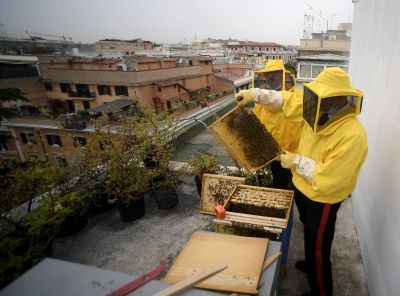The coronavirus epidemic offered a unique opportunity for research of Rome’s urban beehives. For three years, members of the carabinieri, the military police which has a special force charged with protecting forests and the environment, have been tracking three hives atop the roof of the special forestry unit of the police station which house approximately 150,000 bees. With traffic, pollution and noise ceasing abruptly in early March, “they’ve been happy,” stated Raffaele Cirone, president of the Italian Apiculture Federation, when asked about how the bees reacted to the quarantine. “We’ve seen they’ve been more numerous and healthy and those are indications of the nutrition they’ve been getting.” The quality of the bees’ honey has also improved, Cirone added. Tests show that the lack of air pollution has allowed the bees to smell and travel double their usual distance to sample different flowers.
Questa pandemia, però, offre un’opportunità per gli studi delle api in Roma. Per tre anni, i carabinieri, che proteggono le foreste e l’ambiente nazionali, stanno controllando tre alveari, che hanno almeno 150.000 api. Queste api si trovano nei tetti degli edifici dei carabinieri. Con la mancanza del traffico, l’inquinamento, ed i rumori, il presidente della Federazioni Apicoltura Italiana, Raffaele Cirone, ha detto che le api “sono felici adesso”. A proposito del virus, lui ha detto anche che la federazione ha osservato che le api sono più numerose e sane. Questo indica che i nutrienti per le api stanno migliorando. Anche, la qualità del miele è più buono. Gli studi mostrano che la mancanza dell’inquinamento sta aiutando le api ad impollinare una varietà di fiori ed anche a viaggiare ad una distanza più lunga.



